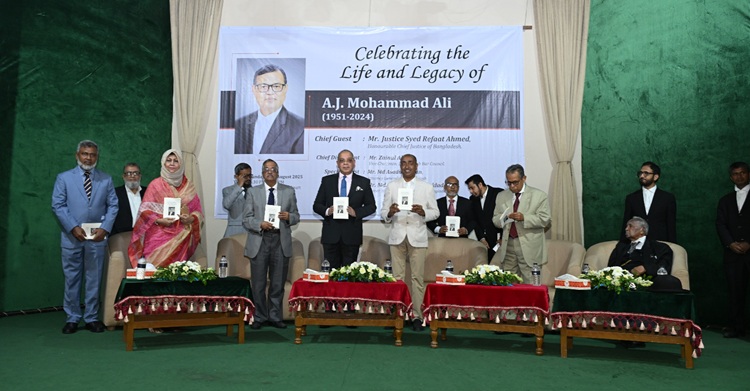Chief Justice Pays Tribute to A.J. Mohammad Ali, Calls for Judicial Reform

Chief Justice of Bangladesh Dr. Justice Syed Refaat Ahmed on Sunday paid an emotional tribute to former Attorney General A.J. Mohammad Ali, recalling his personal bond, professional contributions, and commitment to an independent judiciary, at a memorial event held at the Supreme Court Bar Association (SCBA) Auditorium.
The memorial was chaired by former Justice Md. Sharifuddin Chaklader and attended by Mrs. A.J. Mohammad Ali and her family members, Hon’ble Judges of the Appellate and High Court Divisions, Attorney General Md. Asaduzzaman, Vice Chairman of Bangladesh Bar Council Zainul Abedin, SCBA leaders, senior advocates, members of the Bar, and media representatives.
In his speech, Justice Syed Refaat Ahmed reminisced about growing up in Dhanmondi in the 1960s and 1970s, surrounded by eminent jurists, including Mr. M.H. Khandaker — the first Attorney General of Bangladesh — whose son, “Katy Chachu,” later known as A.J. Mohammad Ali, became a lifelong family friend.
He recalled Mr. Ali’s quiet nature, deep devotion to his parents following a family tragedy, and decision to follow in his father’s legal footsteps.
Also Read : Bangladesh’s Road to Democracy: Lessons from the French Revolution and the 36 July Uprising 2024
Highlighting Mr. Ali’s tenure as President of the Supreme Court Bar Association (2013–2014) and as Attorney General (2005–2007), Justice Ahmed praised his legal acumen, citing their last courtroom engagement in the 2018 Khaleda Zia vs Bangladesh Election Commission case.
He credited Mr. Ali’s arguments with inspiring a jurisprudential approach that integrates moral and constitutional elements into judicial decisions.
The Chief Justice also used the occasion to address the broader debate on judicial independence, particularly the need for an independent Secretariat of the Supreme Court. Emphasizing that institutional independence does not mean judicial dominance, he urged lessons from the UK Constitutional Reform Act of 2005, which balanced separation of powers with inter-institutional collaboration.
“A.J. Mohammad Ali knew that independence without infrastructure is an illusion,” Justice Ahmed said. “No great nation can thrive unless its courts are both constitutionally shielded and administratively empowered.”
He concluded by calling for continued institutional reform, constitutional parity, and a judiciary that is “not only independent in law, but also sovereign in its administration, accessible in its function, and trusted in its voice.”
“Let us remember him when we argue with civility, when we write with clarity, and when we decide with courage,” he urged, pledging to carry forward Mr. Ali’s vision.

